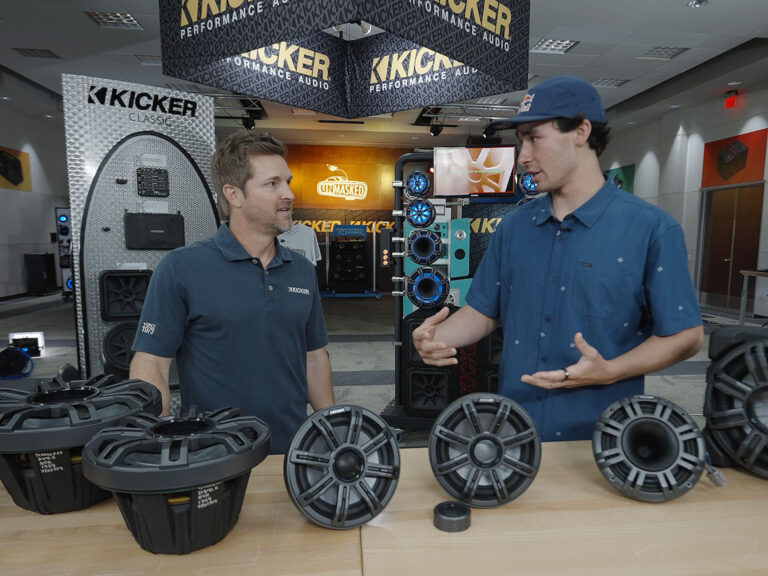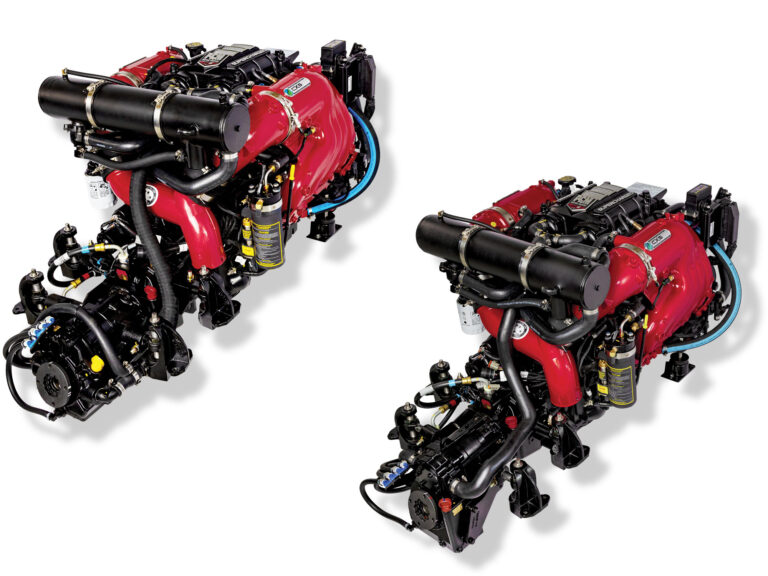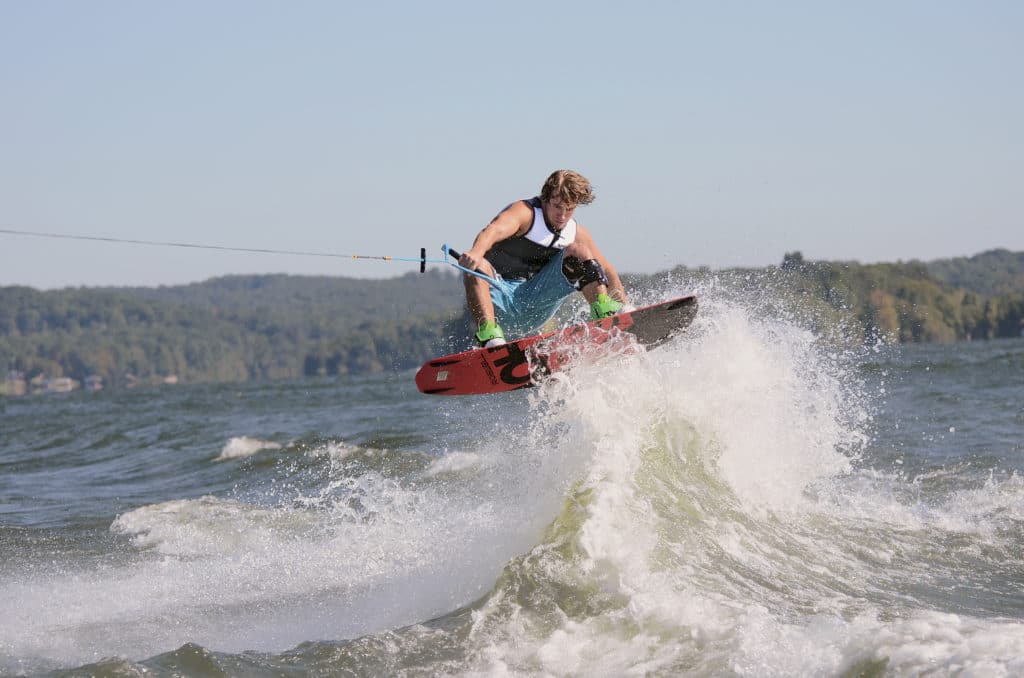
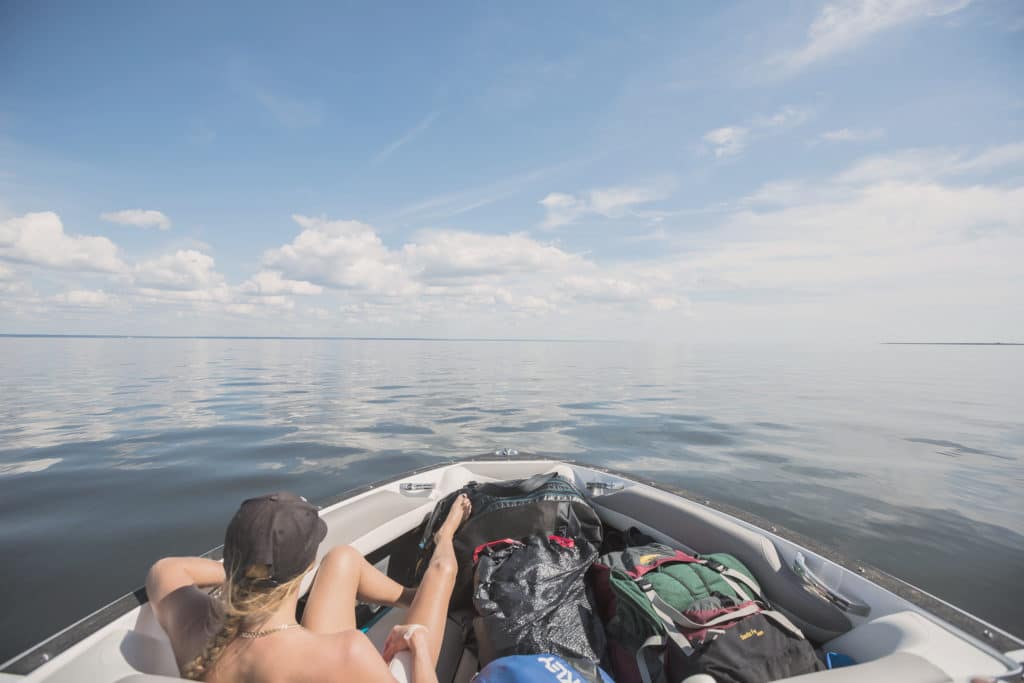
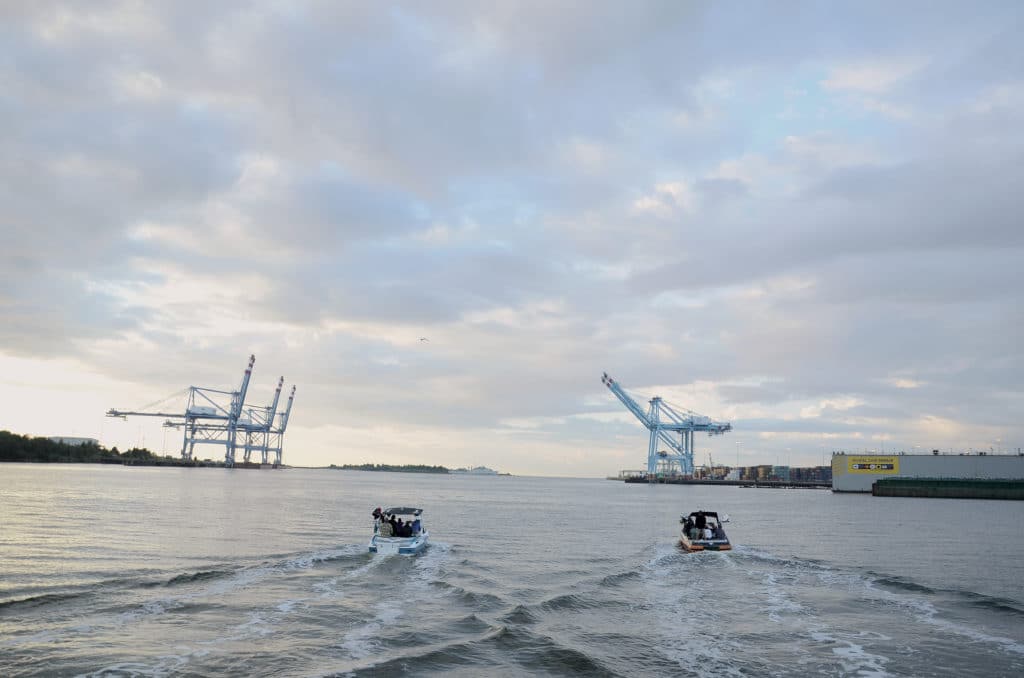
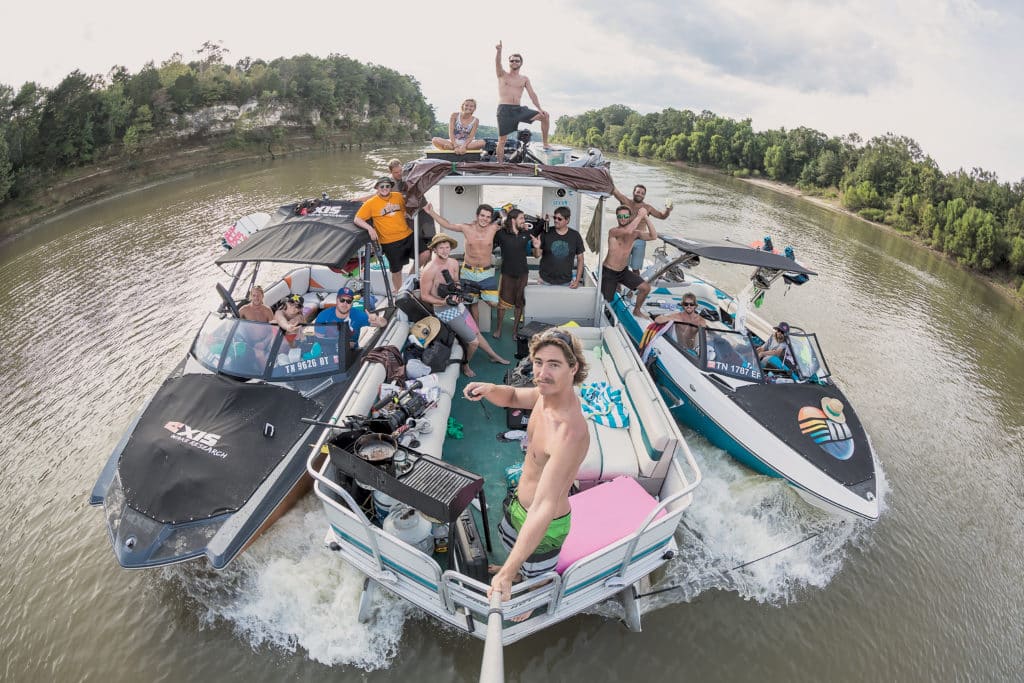
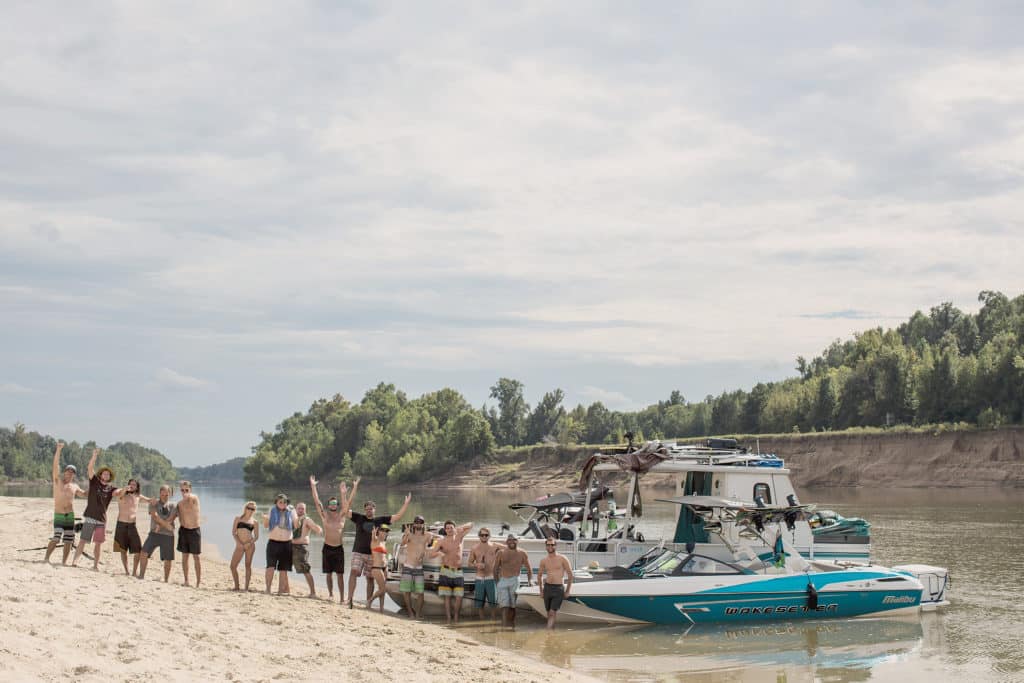
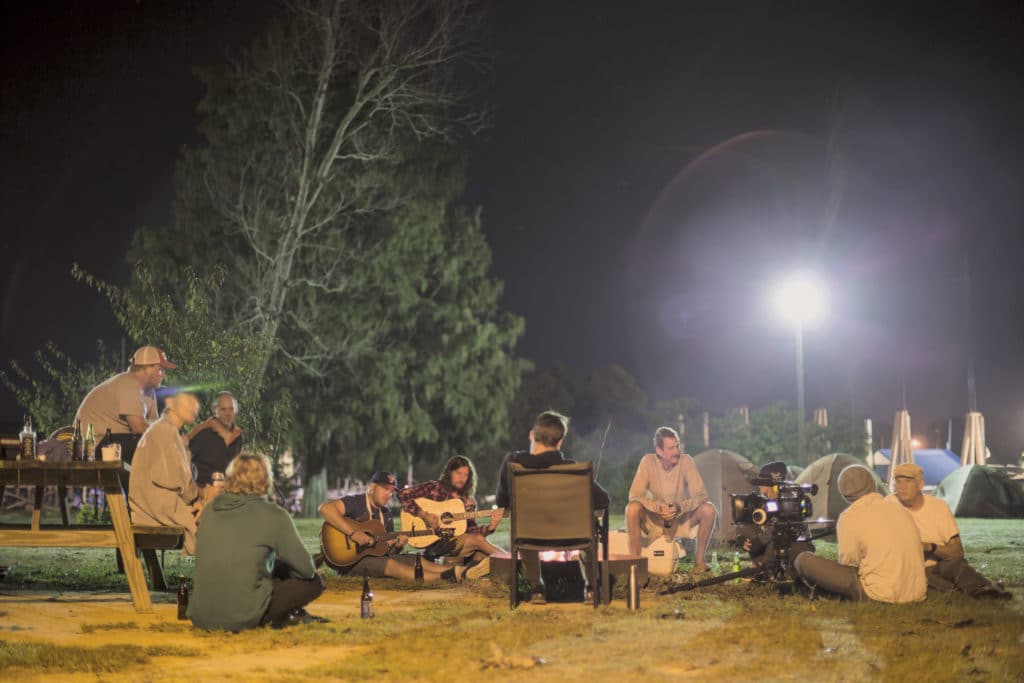
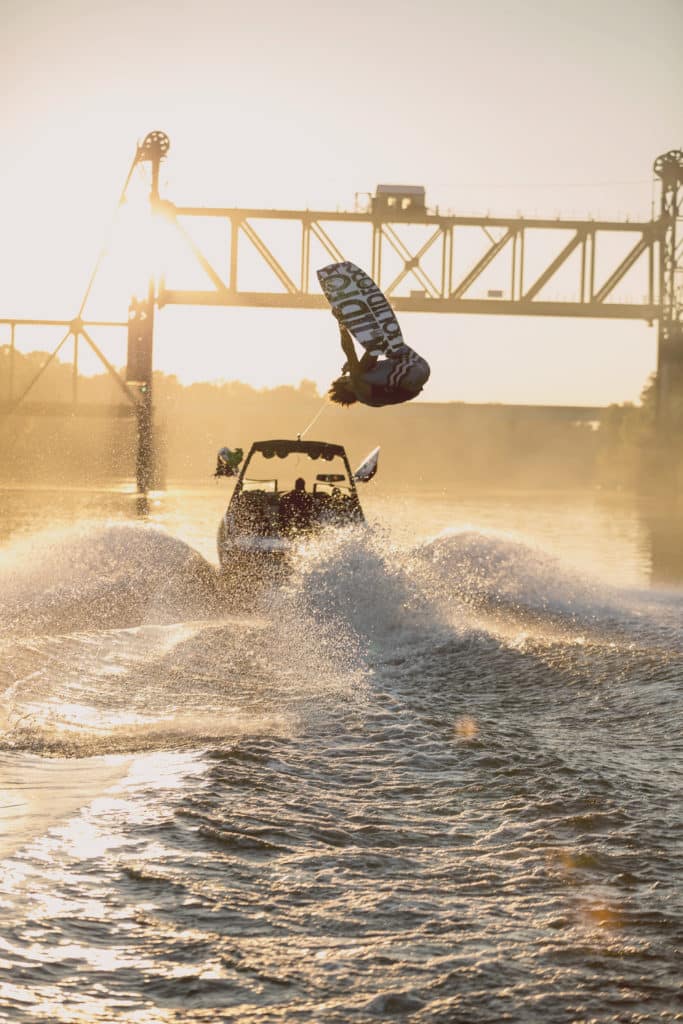
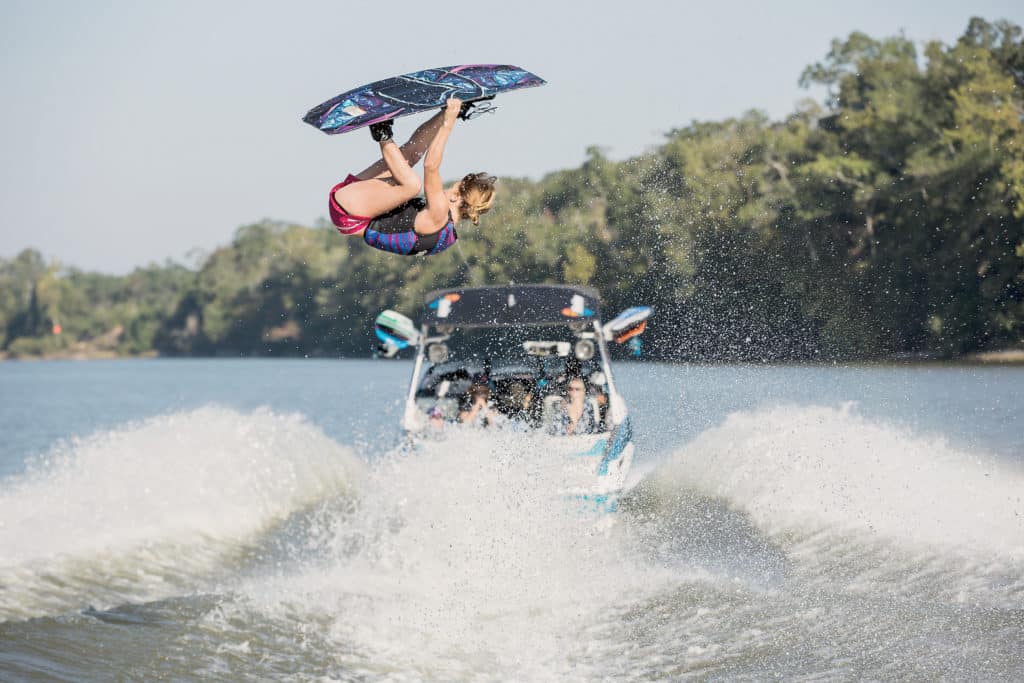
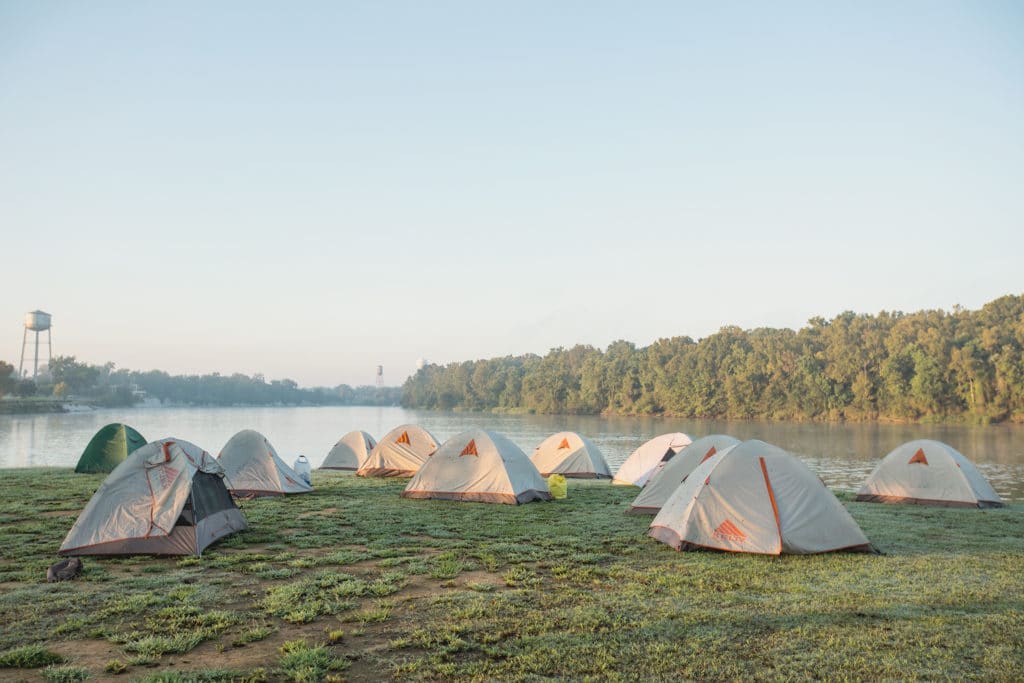
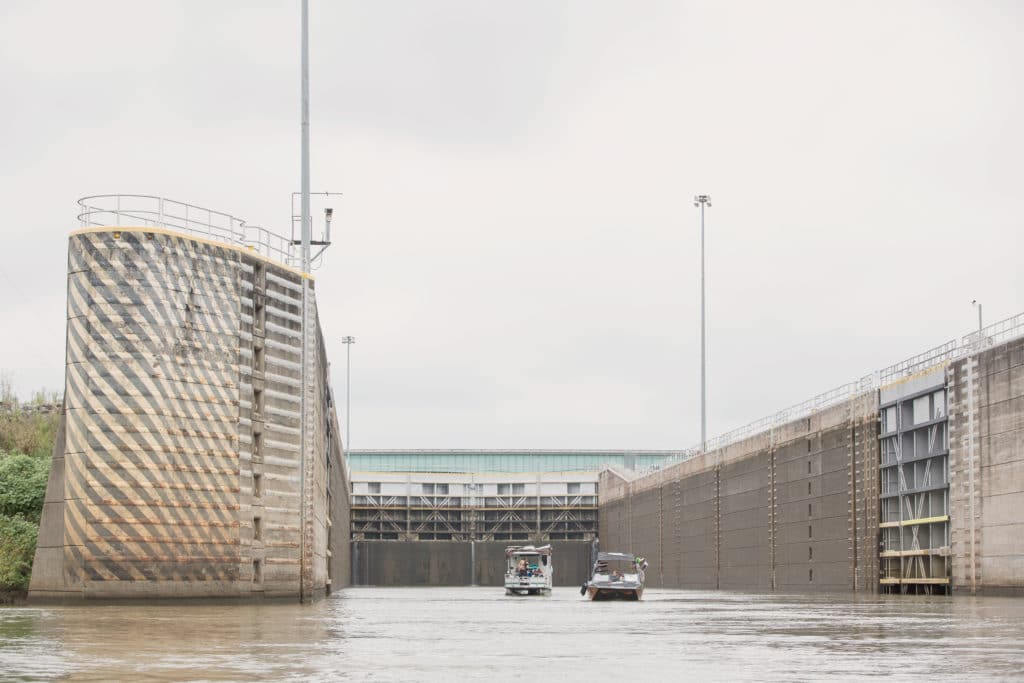
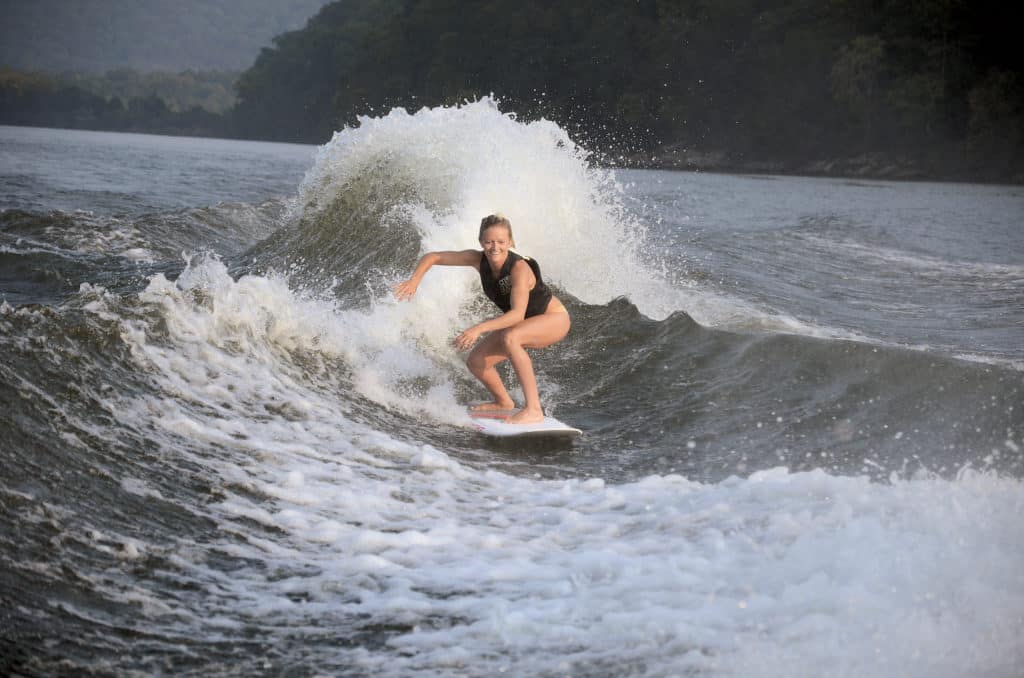
If you haven’t seen The Voyage feature in our March Issue, now’s your chance to catch a glimpse! The Voyage movie world premiere is next friday (05.23.14) in Knoxville, TN. Time to gather your crew and get inspired to leave technology behind and get adventurous.
For more details about the premiere, go to: http://voyage-movie.com
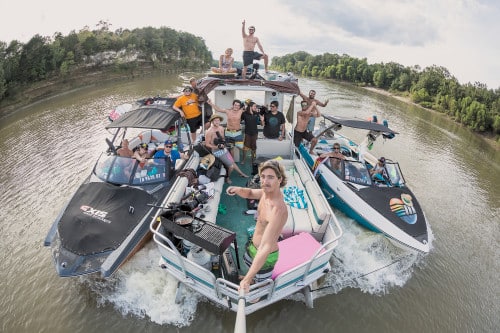
Stats: 1,000 miles | 21 days | 14 guys | Two girls | Three boats
Crew: Collin Harrington — Athlete | Brian Grubb — Athlete | Corrie Dyer — Athlete | Amber Wing — Athlete | Jeff House — Athlete | Alex Oliver — Director | Jared Coleman — Logistics | Brian McNew — Producer | Blake Waring — Production manager | Rob Crawford — Art and copy | Erik Doty — Cinematographer | Alex Lawson — Production assistant | Mitchell Tenpenny — Musician | Brad Clawson — Musician | Clayton Stroop — Production assistant | Chad Borba — Boat technician
Mission:
To pack 16 people onto three boats and document an adventure from east Tennessee to the Gulf of Mexico via the Tennessee and Tombigbee river systems. Cellphones were put into a box upon arrival and used only if absolutely necessary. The goal was to encourage others to seek adventure and passions that became dormant after falling victim to routine.
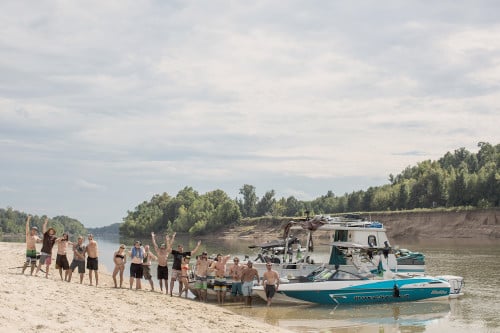
Rob Crawford: “Society demands productivity. This was a trip to get away from that sort of thinking. I think we owe it to ourselves and each other to balance work and play, understanding that moving forward at all times is not always the most beneficial option — oftentimes its better to be still, to be present, to be alive. When you’re stuck on a 24-foot boat with somebody for three weeks, you don’t really have the option of being superficial. Your true colors will inevitably bleed through, and truth is exposed. When you’re stripped back to your core, there’s some serious potential for growth. When the sum of 16 people’s experience converges for three weeks, there’s a wealth of wisdom and insight to be shared by all.”
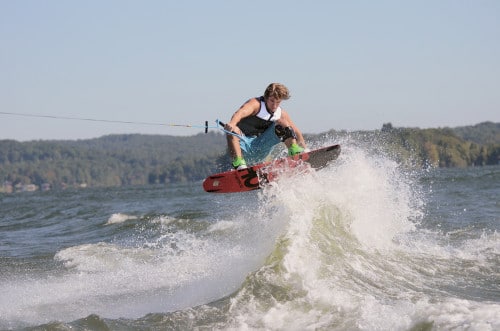
Voyage is one of those trips where you are unsure of what to expect. There was no planned day-to-day routine; our goal was simply to start in one place, end in another and let adventure fill the rest. The list of things that could go wrong was full: It was the middle of hurricane season; we were traveling on three boats that could break down or sink; people could get injured and sick; and the crew might not get along in tight quarters. On the other hand, the list of things that could go right was equally big: meeting new friends, riding endless glass, completely revitalizing yourself and having the trip of a lifetime. The best option for all of us was not to expect anything. We just opened our minds, disconnected from everything and let go of all expectations to connect with the present surroundings.
It’s impossible to tell this story day by day because after 1,000 miles over 21 days, it all blends together. It was a good blend though, a blend that melts away the worries, troubles and stress that make up the endless daily grind we have convinced ourselves is absolutely necessary. There were no newscasters talking about President Obama, no emails demanding deadlines, no phone calls or texting, no distractions at all. We were living in the moment, something, more often than not, we don’t always stop to enjoy and appreciate. For 21 days, all we had was our crew, nature, endless glassy water and the occasional southern folks who permanently live the life we sought.
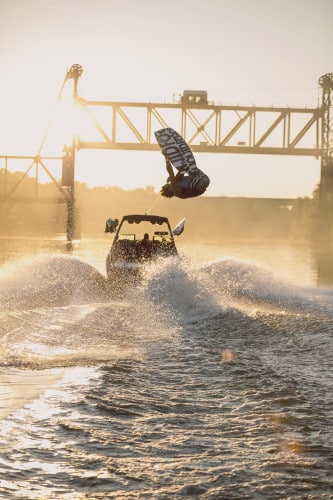
With 16 people, half of whom had never met each other, there was destined to be some drama or those who simply didn’t bother to get to know each other. Voyage proved different, though. We were all in this mission together and knew this would be successful only as a team effort. Without our heads buried in our phones all day, we actually took the time to communicate with each other. By living in the moment and dealing only with our surroundings, this trip turned out to be one of the most relaxing few weeks of our lives.
Chad Borba: “Day two was super-humbling for me. I had a small anxiety attack not having my phone or connection to the world or my comfort zone that I am so accustomed to. On days three through four, I realized just how small I was and that the dealership, family and world would continue to operate just fine without me. I can honestly say it’s the first time in my life that I truly relaxed and took in God’s creation.”
Disconnecting from the world is easy right? Wrong. Alex and the crew from JAOPro had this project in the works for the past four years. It was supposed to happen the last two years, but everyone’s schedules never quite lined up right. I spent 10 days in China, went home for one day, repacked, came straight to the Voyage trip and still had get tickets arranged for a trip to Abu Dhabi, United Arab Emirates, two days after this one. Keep in mind that this trip directly followed five months of almost nonstop traveling. Brian Grubb was on the road for another month following this trip. The JAOPro production crew had deadlines to meet; Borba has a boat dealership to run and others have full-time jobs, as well family and children at home. Everyone had something before and after this trip. To ask everyone to just lose contact and slow down for such a long time in the middle of the season almost seemed like a joke. Yet somehow, all16 people put their everyday lives on hold and lived at the mercy of nature for three weeks.
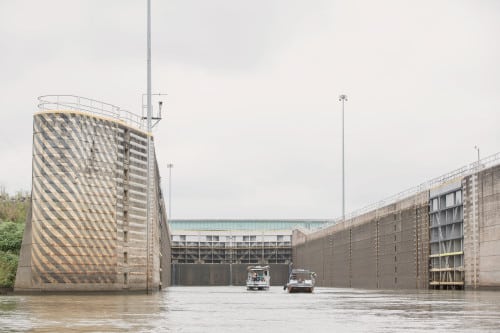
Grubb: _”__It was actually a good feeling to go without technology for a few weeks. It makes you realize that you don’t really need it and is only a distraction from life. I mean think about it: When you’re bored, the first thing you reach for is your phone and the hundred apps you have to play with. At times, you aren’t even thinking about it; it’s just an instinct. It’s a cool feeling when you can see that and instead just enjoy the people and environment around you.”_
The Boats:
Malibu and Axis Wake each gave us a brand-new 2014 boat with zero hours for this trip. JAOPro also bought a used 30-foot pontoon boat (aka the Poon Toon) right before the trip. Personally, I would have bet a lot of money that one would have had some issues. Despite all the people, more than a dozen tents, camping gear, cameras, clothes bags, boards, 60 cases of SweetWater beer, food, coolers tied to the boat platforms, and 150 hours on each engine, the only problem we had was a dinged prop. I’m not trying to toot anyone’s horn here, but that’s impressive. Space was surprisingly comfortable too. The Poon Toon was designated for the camera crew and its gear, and everything else went in the wakeboard boats. Organization of everything was dialed in after a few days, and every nook had a designated item.
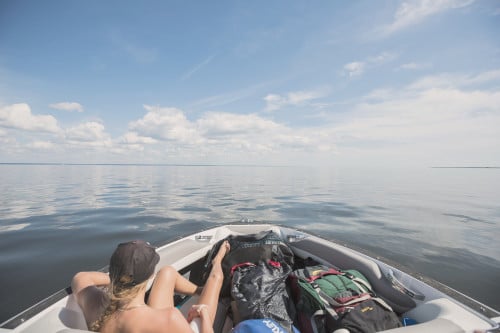
Corrie Dyer: _”__This story is definitely not my favorite moment from the trip, but it is definitely one of my favorite stories to tell. We were at our halfway mark around Tupelo, Mississippi. The boats were parked and covered for a few days to meet the road crew, to restock, pick up Amber and wait out a rainstorm. Once we were back on the river, Grubb was itching to take a set, and it was the first time either of the boats had been on plane in a couple days. We had the boats stuffed full of all of our gear and food, so it was normal for things to shift when the boat was getting up to speed. This time was no different; as we were getting on plane, everything shifted and things fell toward my back. No big deal. A few moments later, I noticed everything had already slid toward me, but something was still moving on my back for a few seconds. I turned to see what it was, and a rat the size of a loaf of bread crawled over my lap! I screamed at the top of my lungs, and within the blink of an eye, it was sitting on the bow of the boat. No one even knew why I was screaming at that point, and they were all yelling at me to chill out, but as the rat made its way around the rest of the boat, they realized why I was screaming. The rat ended up crawling back into a cubby before anyone could react. We spent the rest of the night searching for it, but we ended up never finding that pesky rat.” _
Riding:
The riding conditions were perfect for almost the entire trip. The air was hot; the water temp was refreshing; we had two perfect wakes to choose from, and it was pretty much always flat calm. If it wasn’t, we just went around the next bend where there was flat water again. It was a dream scenario for riding, and it was at our fingertips for three weeks straight. The main purpose of this adventure was not to make a wakeboard film, so there was no pressure to ride all the time. When the light and the water were perfect, we would ride and film. Other times, we simply cruised, wakesurfed or wakeboarded some more.
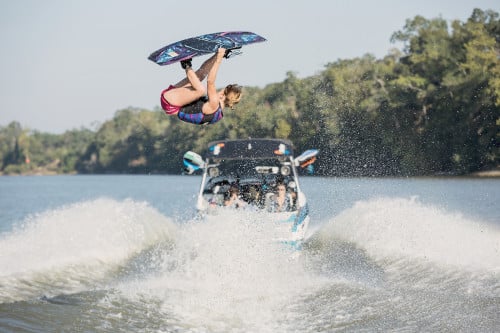
**Food: **
With limited space and a lot of people to feed, food had to be well thought out. We definitely were not going to be eating steaks for dinner. We had a propane grill on which we could boil water and cook. Most breakfasts consisted of oatmeal and coffee. Who can go without coffee for three weeks? Not us. We had random fruits and some lunchmeats for lunch. And dinner consisted of lots of beans and rice. We also had hot dogs and sausages that could be thrown in with any meal. There were a couple of restaurants along the way that were a nice treat, although pretty much all of them specialized in fried catfish or deep-fried other stuff. After all, we were in the Deep South.
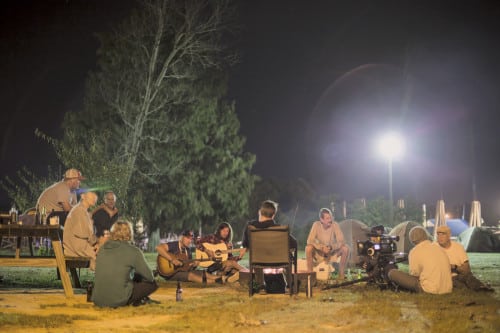
Hygiene: With no bathrooms or showers in sight 95 percent of the time, we had to do what we had to do. Does a bear poop in the woods? Does a fish poop in the water? Yes, they do, and so did we. Aqua poos are actually quite enjoyable; I highly recommend trying one. With 16 of us on the same program, it became a funny conversation piece most of the time. Malibu was kind enough to add a shower hose to the boat for us. It was simply lake water that was heated by the engine. We would lather up with Campsuds and rinse off either in the river or with the hot boat water. That was it. With just three actual shower stalls found during the trip, the boat shower was crucial.
Camping: Camping is something you’re either into or you’re not. Personally, I love it. Twenty-one days of camping is a whole different ball game though. It was the most consecutive days any of us had ever camped. Borba had actually never camped before; he definitely got a crash course. Eagles Nest Outfitters donated a bunch of tents and hammock tents, so everyone had their own setup to call their own. It was up to each individual to keep his or her setup clean and dry. Our campsites varied each night. We would cruise until sunset and then find a place that looked suitable for camping. Some nights, we found primitive campsites, which are cleared spots intended for tent camping with no amenities, such as bathrooms or fire pits. A few nights were spent on small sand beaches that formed around some river bends. Two nights were spent next to a marina, which had a restaurant, showers, toilets and a nearby town, where we restocked our food supplies. The other nights we just simply posted up in the mosquito-infested woods and pitched our tents. The mosquitos would come out at dusk, so every evening we would put rain gear or long clothes on to avoid a plethora of bloodthirsty mosquitos — no matter how hot the temperature.
One thing was guaranteed every night, though: We had a campfire, music and Sweetwater beer. SweetWater Brewery Co. donated 60 cases of beer for the trip, which was very much appreciated and useful. Many nights were hot, humid and mosquito-infested, so you had to sip a few extra SweetWaters to actually get some rest. Brad Clawson and Mitchell Tenpenny are great guitar players, so they would jam out every night as we all shared stories and sang along. They actually have an album coming out titled Black Crow. It was like we had our own personal band with us the entire trip. Everyone played a roll in Voyage’s success.
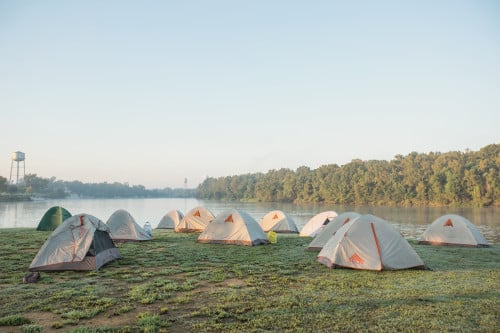
Corrie: _”__I expected to encounter bugs on the trip, but I think it was safe to say I underestimated the insane amount of mosquitos and how it was nearly impossible to escape from them. At the beginning of the trip, House and I had the genius plan to sleep in the boats with tarps over them to avoid carrying everything to shore and back early in the morning — not-so-genius though. I know one night I didn’t sleep for more than two hours. Not only would the bugs bite through whatever you were wearing and whatever type of bug spray you used, but you could also hear them buzzing around your head all night long, and it would keep you awake. After that particular night, I woke up and counted over 80 mosquito bites on one arm alone.”_
Navigation:
Since we opted to do this trip without our phones, our navigation system consisted of a 1980s Tenn-Tom river book and the occasional mile marker. The book shared camp-able spots (non-nature reserve areas), famous landmarks, a few gas dock locations, lock locations and some random history of the waterways. Turns out, things have changed since the ’80s and some fuel docks no longer sold gas.****
On days that we had more than 100 miles to travel to reach the next fuel station, we would have to conserve our fuel consumption. We would tie all three boats together with the Poon Toon in the middle. We would run the two wake boats at about 6 knots and turn off the Poon Toon. After an hour or so, we would then run the Poon Toon around 6 knots and turn off the wake boats. This also meant no riding for the day because it would burn too much fuel. We sometimes cruised the entire day like this. Everyone was forced to entertain themselves with their surroundings.
The water levels are controlled by lock systems. We had to go through 19 of them throughout our trip. You drive into these massive gates that shut behind you and lock you into a giant tub of water. They then open the bottom gates, and the water slowly drops (sometimes 50 feet or more) to the level of the river below. They were built so that cargo barges can get through them, so our tiny little boats were dwarfed by the giant walls.
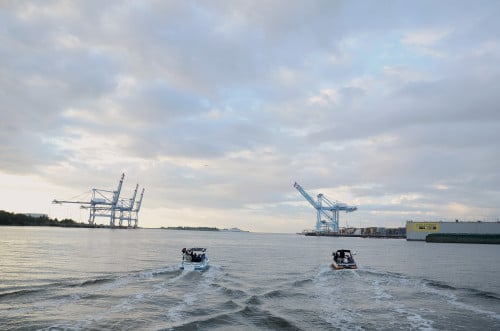
Amber Wing:_ “__The biggest thing I found by not being on my phone for days on end was that I would be completely aware and observant of everyone’s personalities. What kept them occupied — drinking, playing music, card games, trivia games, reading a book, writing in a journal, whether they enjoyed being by themselves or sought after company in others to amuse them day after day. Not being on your phone most of the day frees your mind to wonder and think about life, what you have done or want to do, actions, and how the consequences of your actions affect other people, as you have nowhere to run. I watched people get mad then get over it, which built friends for life.”_
Southern Hospitality:
One day, we met a family and told them what we were doing. They insisted that we come stay the night on their houseboat, which they had docked behind their house. With it raining on and off the whole day, we took them up on their offer. They had a beautiful place on the river with a big houseboat that a few of us stayed on while others setup tents in their backyard. They took us in like we were family. That night, they had a catfish and hush puppy cookout for us. It turned out to be a very memorable night. We had already been running a while since our last fuel stop, so we were planning on getting gas at the next gas station, which the book said was another 50 miles or so away. Thank goodness we met them because they informed us that the station no longer sold gas and that it was 135 miles till the next fill-up spot. This meant that there was no way we would make it to the next fuel dock. They had a trailer with a big gas tank and offered to fill up all three boats so we could make it to the next station. We had no choice but to take them up on their offer.
Their hospitality was something you don’t see often, and we could not have made the next spot without their generosity. This seemed to be the case for everyone we met along the way. JAOPro interviewed many people we met to get their perspectives on life. All of them seemed perfectly content with what they had, no matter how little. Family and simplicity seemed to be the top priorities every time. Everyone seemed to take the time to enjoy the beauty of his or her surroundings. Using what you need and giving back what you can is the way they grew up, and they wanted their kids to have the opportunity to grow up the same way. Everyone seemed to live simple, stress-free lives. One day, we interviewed one of the owners of Bobby’s Fish Camp, which is a small fuel dock, camping site and restaurant specializing in, yes, fried catfish, that’s been around for 60 years. At the end of her interview, she said, “YOLO, you only live once.” Now this has become a phrase that we joke about a lot, but for some reason when she said it — and meant it — we realized that she was completely right, and for the first time, that phrase actually took on a real meaning and made complete sense to all of us.
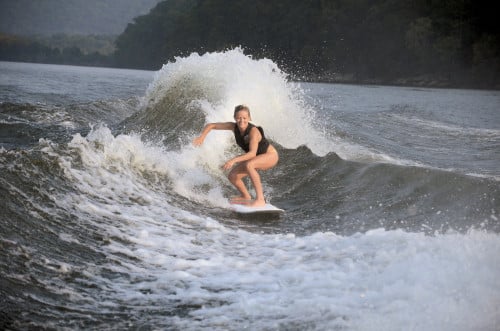
Alex: _”__One of my favorite moments on the trip happened at the end of our first week in Ditto Alabama. We arrived to camp at sunset, exhausted from our first week on the river with the reality of a three-week camping trip finally setting in. That night, we encountered two girls relaxing in ENO hammocks near our campsite who started up a conversation with a few of our weary crew members. They were excited by the concept of Voyage and especially captivated by our choice to forego phones for three weeks. They asked for us to wait on them before departing. The next morning, not knowing their agenda and eager to keep our pace on the river, we began to untie the boats to leave Ditto Landing. Just as we untied the last dock line, the girls arrived with a basket full of biscuits, bacon and a letter on top. Amazed at the generosity and thrilled to eat something more than oatmeal for breakfast, we thanked them and set off. A mile down river we opened the letter and read it over the radio to all three boats. It’s safe to say we were all inspired and moved by its encouraging words and the personal stories it shared. For the first time on the trip, we realized that Voyage truly had the ability to inspire others to pursue their own passions in life. I find it incredibly humbling when we are blessed with the opportunity to encourage others to do just that.”_
The Last Day:
On the last day, we awoke before sunrise to start our final stretch to the Gulf. It was a beautiful clear orange sunrise. Everyone was excited that we were actually going to complete our mission. We still did not know what lay ahead, except for the fact that we had 9 miles left. As the sun rose, so did the skyline and bridges of a small city. Mobile, Alabama, is a big shipping port, so here were these three tiny boats dwarfed by giant cargo ships ranging from 100 to 1,000 feet. It was almost a sensory overload after 20 days of solitude in nature. For the last 100 miles of the trip, there were no fuel docks, and we were almost out of fuel. Fueling up at the same dock as a 1,000-foot cargo ship was not an option. We eventually found a fisherman, and he told us the only fuel dock was out of the mouth of the port and around in the next bay. Were we really going to run out of fuel on the last few miles of the trip?
We pressed on around the final bend, and there it was, the Gulf of Mexico. The river we had traveled on for the last 20 days just simply stopped and opened up as far as the eye could see. Everyone was excited that this project, four years in the making, was actually being completed. It was a strange realization though. As ecstatic as we all were, we also realized the trip was over. As we officially exited the mouth of the bay, the waves grew bigger and the wind grew stronger. We were no longer surrounded by land and calm water. After a couple of waves crashed over the front of the Poon Toon, we quickly realized that it was not an open-ocean boat. Now besides possibly running out of fuel, we were worried about sinking a boat full of the camera gear that held all documentation from the entire trip. We quickly stopped and put the Pelican cases full of cameras and hard drives in the wake boats just in case. We continued in the direction in which we were told the fuel dock would be. After a rough 20-minute ride, we made it to a fuel dock in Dog River, where we officially completed Voyage. With 152.6 hours on each engine and minimal fuel left, we all stood on dry ground and smiled as we completed what we all knew was a special adventure that none of us would ever forget.
Howard Thurman once said, “Don’t ask what the world needs. Ask what makes you come alive, and go do it. Because what the world needs is people who have come alive.”
VIDEO: https://vimeo.com/81062931
Website: http://voyage-movie.com
Original Voyage Teaser:
http://www.jaopro.com/projects/jaopro-voyage-teaser/
Twitter: @VoyageMovie
Instagram: @voyagemovie
Facebook: facebook.com/VoyageMovie
#VoyageMovie




